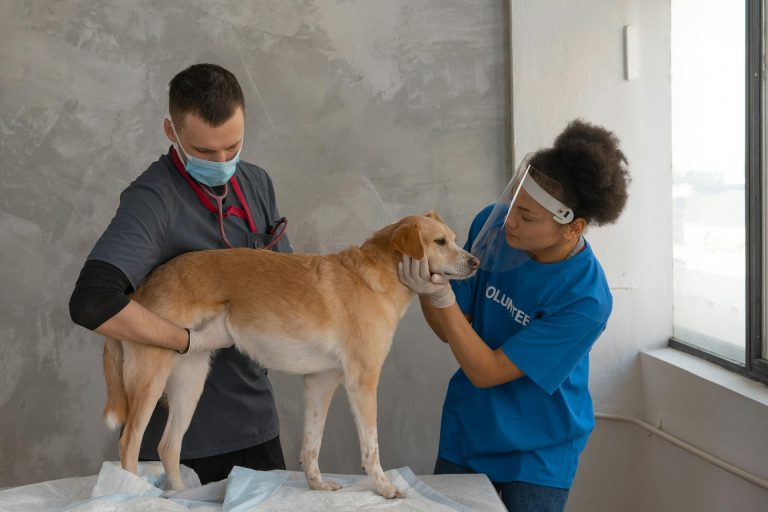Pet Insurance Cover
Pet insurance is a type of insurance that helps cover the cost of veterinary care for your pets. Just like health insurance for humans, pet insurance provides financial protection in case your pet gets sick or injured. It can help alleviate the financial burden of unexpected vet bills and ensure that your pet receives the necessary medical treatment. Pet insurance is becoming increasingly popular among pet owners, as it offers peace of mind and allows them to provide the best care for their furry friends.
Key Takeaways
- Pet insurance is a policy that covers the cost of veterinary treatment for your pet.
- Pet insurance is important because unexpected vet bills can be expensive and difficult to afford.
- There are different types of pet insurance cover available in the UK, including accident-only, time-limited, and lifetime cover.
- The cost of pet insurance in the UK varies depending on the type of cover and the age and breed of your pet.
- To choose the best pet insurance policy for your pet, consider the level of cover, the excess, and any exclusions.
What is pet insurance?
Pet insurance is a contract between you and an insurance company that helps cover the cost of veterinary care for your pets. It works by paying a monthly or annual premium in exchange for coverage for certain medical expenses. When your pet needs medical treatment, you can submit a claim to the insurance company, and if approved, they will reimburse you for a portion of the cost.
There are different types of pet insurance policies available, including accident-only cover, time-limited cover, maximum benefit cover, and lifetime cover. Accident-only cover provides coverage for accidents and injuries, but not for illnesses or pre-existing conditions. Time-limited cover provides coverage for a specific period of time, usually 12 months, and has a limit on the amount that can be claimed per condition. Maximum benefit cover provides coverage up to a certain limit per condition, with no time limit. Lifetime cover is the most comprehensive type of pet insurance, providing coverage for ongoing conditions throughout your pet's lifetime.
Why do you need pet insurance?
Having pet insurance can provide numerous benefits for both you and your pet. Firstly, it helps protect you from unexpected vet bills that can be costly and difficult to afford. Veterinary care can be expensive, especially if your pet requires surgery or long-term treatment. With pet insurance, you can have peace of mind knowing that you will be able to provide the necessary medical care for your pet without worrying about the financial burden.
Secondly, pet insurance allows you to make decisions about your pet's health based on what is best for them, rather than what you can afford. It can be heartbreaking to have to choose between providing the necessary treatment for your pet and the cost of that treatment. With pet insurance, you can focus on what is best for your pet's health and well-being, without having to worry about the cost.
Lastly, pet insurance can help you budget for your pet's healthcare expenses. By paying a monthly or annual premium, you can spread out the cost of veterinary care over time. This can make it easier to manage your finances and ensure that you are able to provide the necessary care for your pet when they need it.
Types of pet insurance cover available in the UK
In the UK, there are several types of pet insurance cover available to suit different needs and budgets. These include accident-only cover, time-limited cover, maximum benefit cover, and lifetime cover.
Accident-only cover is the most basic type of pet insurance and provides coverage for accidents and injuries only. It does not cover illnesses or pre-existing conditions. This type of cover is generally the cheapest option but offers limited protection.
Time-limited cover provides coverage for a specific period of time, usually 12 months. It has a limit on the amount that can be claimed per condition, and once the time limit is reached or the maximum amount is claimed, the condition will no longer be covered.
Maximum benefit cover provides coverage up to a certain limit per condition, with no time limit. This means that you can claim up to the maximum benefit amount for each condition, but once that limit is reached, you will no longer be able to claim for that condition.
Lifetime cover is the most comprehensive type of pet insurance and provides coverage for ongoing conditions throughout your pet's lifetime. It offers the highest level of protection but is also the most expensive option.
How much does pet insurance cost in the UK?
The cost of pet insurance in the UK can vary depending on several factors, including the type of cover, the age and breed of your pet, and your location. Generally, the more comprehensive the cover, the higher the premium will be.
Other factors that can affect the cost of pet insurance include the level of excess you choose, which is the amount you have to pay towards each claim before the insurance company starts to cover the costs, and any optional extras you add to your policy, such as dental cover or overseas travel cover.
On average, pet insurance in the UK can cost anywhere from £20 to £60 per month for dogs and £10 to £30 per month for cats. However, these are just rough estimates, and the actual cost can vary significantly depending on your specific circumstances.
How to choose the best pet insurance policy for your pet?

When choosing a pet insurance policy for your pet, there are several factors that you should consider. Firstly, you should think about what level of cover you need. If you want comprehensive coverage that includes ongoing conditions and no time limits or benefit limits, then lifetime cover may be the best option for you. However, if you are on a tight budget or only want coverage for accidents and injuries, then accident-only cover may be sufficient.
You should also consider the excess amount and any optional extras that are included in the policy. A higher excess amount can help lower your premium but means that you will have to pay more out of pocket towards each claim. Optional extras can provide additional coverage for things like dental care or overseas travel but will also increase the cost of your premium.
It's also important to compare policies from different insurance providers to ensure that you are getting the best value for your money. Look at factors such as coverage limits, waiting periods, and exclusions to determine which policy offers the most comprehensive coverage for your pet's needs.
What does pet insurance cover in the UK?
Pet insurance in the UK typically covers a range of treatments and procedures, including consultations, diagnostic tests, surgeries, medications, and hospital stays. It can also cover emergency treatment, specialist care, and alternative therapies such as acupuncture or physiotherapy.
Some pet insurance policies also offer optional extras that you can add to your policy for an additional cost. These extras can include dental cover, which helps cover the cost of dental treatments and cleanings, and overseas travel cover, which provides coverage for veterinary expenses while traveling abroad with your pet.
It's important to carefully review the terms and conditions of your pet insurance policy to understand exactly what is covered and any limitations or exclusions that may apply.
What is not covered by pet insurance in the UK?
While pet insurance can provide valuable coverage for a wide range of treatments and procedures, there are certain things that are typically not covered by pet insurance in the UK. These include pre-existing conditions, routine treatments and check-ups, and behavioural problems.
Pre-existing conditions are any illnesses or injuries that your pet had before you took out the insurance policy. These conditions are generally not covered by pet insurance, so it's important to disclose any pre-existing conditions when applying for coverage.
Routine treatments and check-ups, such as vaccinations, flea and worm treatments, and annual wellness exams, are also typically not covered by pet insurance. These are considered part of regular preventative care and are the responsibility of the pet owner.
Behavioural problems, such as aggression or anxiety, are generally not covered by pet insurance either. These issues are often considered training or behavioural problems rather than medical conditions.
How to make a claim on your pet insurance policy?
If your pet requires medical treatment and you need to make a claim on your pet insurance policy, there are several steps you will need to follow. Firstly, you should notify your insurance provider as soon as possible. They will provide you with a claim form that you will need to complete and submit along with any supporting documentation.
When completing the claim form, make sure to provide accurate and detailed information about your pet's condition, the treatment they received, and any costs incurred. You may also need to provide copies of veterinary records, invoices, and receipts as proof of the treatment and expenses.
Once you have submitted your claim, the insurance company will review it and determine whether it meets the terms and conditions of your policy. If approved, they will reimburse you for a portion of the costs, usually within a few weeks.
FAQs about pet insurance in the UK
1. Is pet insurance worth it?
Yes, pet insurance can be worth it for many pet owners. It provides financial protection in case your pet gets sick or injured and can help alleviate the financial burden of unexpected vet bills.
2. Can I get pet insurance for an older pet?
Yes, many insurance providers offer coverage for older pets. However, the cost of premiums may be higher, and there may be certain age restrictions or limitations on coverage.
3. Can I switch pet insurance providers?
Yes, you can switch pet insurance providers at any time. However, it's important to carefully review the terms and conditions of the new policy to ensure that it offers the same level of coverage or better than your current policy.
4. Can I get pet insurance if my pet has a pre-existing condition?
Some insurance providers may offer coverage for pre-existing conditions, but these policies are generally more expensive and may have limitations or exclusions. It's important to disclose any pre-existing conditions when applying for coverage.
5. Can I get pet insurance for a rescue pet?
Yes, you can get pet insurance for a rescue pet. However, some insurance providers may require a waiting period before coverage begins to ensure that the pet is healthy and free from any pre-existing conditions.


